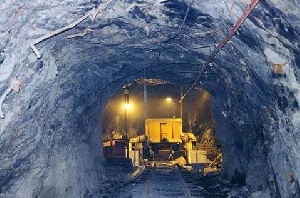 File photo: A gold mine in Ghana
File photo: A gold mine in Ghana
Unreliable power supply remains a key challenge to the sustainability of the mining industry in Ghana, Mr Kwame Addo Kufuor, the President of the Ghana Chamber of Mines, has said.
Speaking at the opening session of the three-day 11th West African Mining and Power Conference in Accra, Mr Kufuor said the unstable power supply had led to the spending of about 20 per cent of mineral revenues on power alone.
He said in 2015 314 million dollars was spent by the mines on power supply, representing an increase of about 20 per cent of mineral revenue earned.
Mr Addo Kufuor called on government and stakeholders to help foster confidence in the sector.
Nii Osah Mills, the Minister of Lands and Natural Resources, whose speech was read on his behalf, said the key roles of mining in sustainable development include a contribution to economic growth through investment injection, employment and personal income generation, government revenue in terms of royalties, taxes, property rates and foreign exchange generation.
He said mining also provided mineral-based products for the use of society adding that minerals serve as the building block of all human activities ranging from construction materials to inputs for manufacturing of automobiles and other product.
Nii Osah Mills said the mining industry transferred technology to other industries and also contributed to infrastructure development.
Available data indicate that total investment into the mining sector from 1980 to 2015 was some US$16 billion as the sector currently contributes 14 per cent of government domestic revenue as captured by the Ghana Revenue Authority’s Domestic Tax Division.
Commenting on the country’s mining environment, Nii Osah Mills said the country had the requisite environment that serious investors needed.
This, he said, include the availability of abundant resources with basic geo-scientific data, political stability, an attractive investment framework, a legislative and institutional framework to reduce corruption and to enforce the rule of law and transparency in the management of mineral resources.
Nii Osah Mills confirmed that the country had a robust, transparent, effective and time-tested legal framework that was friendly for investment in the mining sector.
The major minerals currently being mined in commercial quantities including gold, diamond, bauxite and manganese have positioned the country as a conducive investment environment created by successive governments since 1980 and this had led to a significant inflow of the mining sector investment.
“Government will continue to work at improving its facilitation role while working with all other stakeholders towards achieving sustainable investments in the sector. I challenge all other stakeholders to play their part so that we can foster sustainable development through mining,” he said.
Mr Kweku A. Awotwi, an energy and power expert, said the energy crisis had left the mining industry uncertain of the future.
He said for a capital intensive business such as mining, the uncertainty about the security and stability of power supply impacted significantly on investment.
The conference is on the theme: “Sustaining Mining and Power Investments: Meeting Stakeholder Expectations in a Challenging Global Environment.”